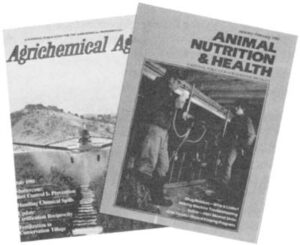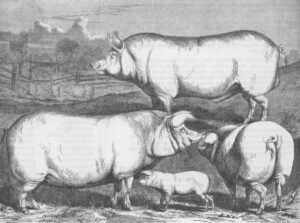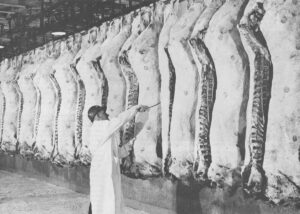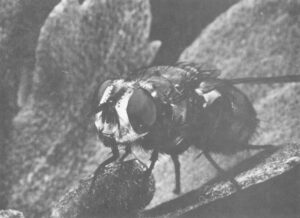Orville Schell
- 1980

Fellowship Title:
- The Reliance on Drugs in the U.S. Meat Industry
Fellowship Year:
- 1980

Deregulating The Farmer
SAN FRANCISCO–”Organic farming is a fraud. And so is the health food industry. So are the notions that preservatives, pesticides, drugs and plant foods are bad, and ‘natural’ is good,” writes Dick Beeler in his monthly column which appears in the two glossy agriculture magazines, Animal Health and Nutrition and Agrichemical Age, which he edits. Dick Beeler, editor of Agrichemical Age and Animal Health and Nutrition. Animal Health and Nutrition and Agrichemical Age This “inspired anti-chemical and anti-science group”, says Beeler, is “out to kill the capitalist system, and they know that the surest way to accomplish this is to destroy modern food production.” “…The greedy die-hard promoters of the ‘organic’ and health food movements, and those who oppose modern science and industry are working in concert, and they are in it for everything they have,” continues Beeler in another column. “Theirs is a crime against us, our families, friends and neighbors.” “Our choice is simple: Wake up or go hungry.” From Dick Beeler’s perspective, America has in fact woken up. It woke up

The Meat Inspector
BOLINAS, CA.– “OK. You see that discoloration here, that’s caused by pneumonia,” says Dr. Thomas Harris, DVM, Inspector-in-Charge for the U.S. Department of Agriculture’s Meat and Poultry Inspection Program. He points at a large pink bovine lung, and slices into it with a butcher knife. Next to it are a jumble of other internal organs which have just been removed from a freshly butchered steer, which hangs upside down behind Harris minus its hooves, head, and tail on an overhead track. Harris is a meat inspector at McDermott’s Formula Fed Beef packing plant just across the bay from San Francisco, beside Interstate 80. Meat inspectors on the job. “I can’t pass a lung like like that;’ says Harris, stamping it, “Condemned” with a purple stamp and dispensing it into a large plastic drum marked “DOG FOOD” “It’s OK for dogs. But first it’s got to be cooked and sterilized, because you know there are a lot of people out there, you know, poor people, who eat canned dog food.” As he speaks, a burly man

Guinea Pigs
I know it’s difficult to extrapolate backwards from one’s dinner plate, where you might have had a pork chop looking up at you, or from a supermarket where you might be visiting the meat counter to decide which steak to buy. To extrapolate back to where all this comes from is what I’ve been trying to do this year, to this incredibly vast world which is like a supply unit that keeps an army in the field and which lies behind the meat that we all eat. It’s a world, as some of you may know, some of you may not, of feedlots that cover hundreds of acres just rolled out with animals shoulder to shoulder, of confinement barns for hogs which are as large as Grand Central Station, no windows, food is brought in mechanically, manure is taken out mechanically. This is an incredible world of technology, and, I might add, a world dependent on drugs and chemicals in order to raise this meat. The meat is relatively inexpensive, actually in many respects, it’s

Antibiotics in Your Meat
(LONG BEACH, CA.) – The storage tanks of Rachelle Laboratories, Inc. stand like grain silos along the Terminal Island Freeway in Long Beach, California. They are filled with hundreds of tons of Chlorachel, a Chlortetracycline animal feed additive which Rachelle markets for livestock and poultry. From the freeway, the Rachelle complex looks like an oil refinery. Iron catwalks, steel piping, stacks emitting steam surround the large fermenters, crystalizers, blenders and baggers. Warehouses are filled with multi-walled 50 pound plastics sacks and hundred-pound fibre drums of Chlortetracycline stacked up in piles like displays at a supermarket. For people accustomed to thinking of antibiotics in terms of a few cc’s withdrawn from small rubber stoppered bottles for intramuscular injections, the sheer bulk of the antibiotics manufactured by Rachelle (the nation’s second largest manufacturer of Chlortetracycline after American Cyanamid) is overwhelming. As the Rachelle catalogue for Animal Health and Feed Additive Products reminds prospective buyers, minimum orders for most varieties is one ton. “This is the greatest country in the world in terms of agricultural production,” says Len

Flies vs. Wasps
(FT. MORGAN, CO) — When the insecticide salesman arrived at Fred Diehl’s Dairy in Dodge City, Kansas, it was undeniable that Fred had a problem. During the summer heat his sixty head of registered Holstein milk cows were so harrassed by flies their milk production was suffering. After hearing the sales pitch, Fred got sold an automatic sprayer — “the whole works” as he remembers it — which when fastened to the door of the milking parlor automatically sprayed each cow with Vapona (a chlorinated organo-phosphate which acts on the nervous sysiern causing convulsions and death) as it walked out after being milked. “You pretty near had to use something,” says Fred with resignation, leaning against the pasteurizer in the dairy he is now too weak and sick to work. “Those flies were all over the cows.” As he talks, he repeatedly rubs his pale forehead with one hand as if trying to ease some deep inner pain. Indeed, the Vapona spray did help control the flies, and Fred’s cows did appear more comfortable. But
